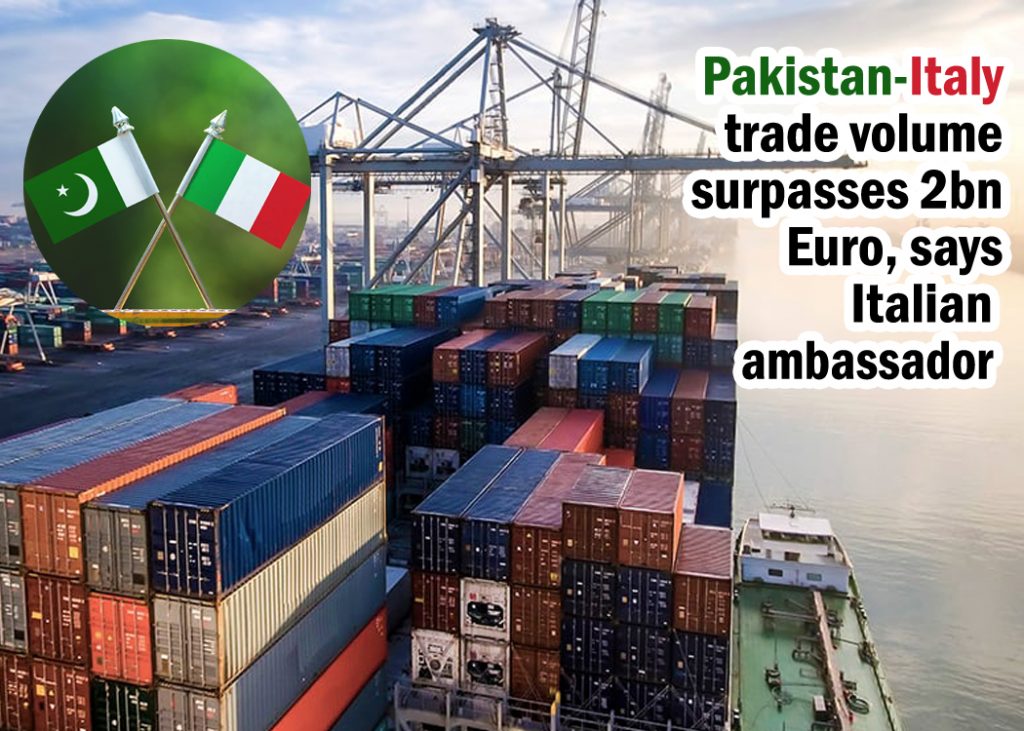
AVN Report
KARACHI: The bilateral trade volume between Pakistan and Italy, showing a steady growth, has surpassed the 2 billion Euro mark, with remittances from Pakistanis residing in Italy rising to 1 billion Euros.
The good news was disclosed by Italian Ambassador to Pakistan, Andreas Ferrarese, during a seminar on Italian Cooperation in Pakistan, which was jointly organised by the Italian Agency for Development Cooperation, Islamabad, and the Consulate of Italy, Karachi.
The event was also graced by Consul General of Italy in Karachi Danilo Giurdanella, and Head of Italian Development Committee Aarij Iqbal.
The seminar highlighted the significant role of Italian cooperation in various sectors of Pakistan.
Francesco Zatta, Head of Office of the Italian Agency for Development Cooperation (AICS) Islamabad, in his keynote address, explained that AICS is involved in several multi-sectoral activities in Pakistan and Afghanistan. The agency aims to align Italy with its European and global partners in various development endeavors.
AICS adopts a flexible and innovative approach in response to the continuously evolving development landscape. The agency has flagship programmes and projects in Pakistan that address a wide range of objectives, including establishing links between research, education, and labour for effective cooperation. Additionally, their development cooperation efforts focus on enhancing resilience and adaptation to climate change while preserving natural and cultural heritage.
Given the ongoing climate change challenges and natural disasters, it is increasingly crucial to invest in initiatives that ensure climate change mitigation and adaptation.
The ‘Glaciers and Students’ project is a unique endeavor aimed at supporting environmental monitoring and natural resource management in the Central Karakorum National Park and the Deosai National Park. This project utilises remote sensing and GIS techniques to assess risks related to GLOFs and hydro-geological hazards.
The project also involves Pakistani universities in field activities through comprehensive training and capacity-building programmes in glaciology monitoring and remote sensing analysis. This approach provides the necessary tools for long-term research goals and transparent data communication related to environmental issues.
AICS’s environmental projects in northern Pakistan also contribute to safeguarding the livelihoods of remote communities and the preservation of biodiversity and fragile ecosystems.
AICS places a strong emphasis on female literacy and raising awareness about cultural and natural heritage in Pakistan. To this end, two important projects have been initiated. The first project, titled ‘Support to Girls’ Right to Education and Safeguarding Cultural Heritage through Education in Pakistan,’ operates in the districts of Swat and Bahawalpur. Its primary objectives include strengthening the government’s capacity to deliver quality education and improving girls’ access to schools.
The second project, ‘Olive Culture,’ focuses on the successful cultivation of olive trees in Pakistan. This initiative not only promotes nutrition and environmental resilience, but also encourages women’s participation while providing a consistent source of income. The project has benefited numerous individuals by alleviating poverty, providing technical and vocational training, and opening up new work opportunities.
Francesco Zatta also highlighted the Pakistan-Italy Debt Swap Agreement, initiated in January 2009, which has led to the execution of 48 impactful projects in various districts across Pakistan. AICS remains committed to its mission of providing assistance, enhancing local capacities, and supporting basic needs in line with Pakistan’s sustainable development strategy.








